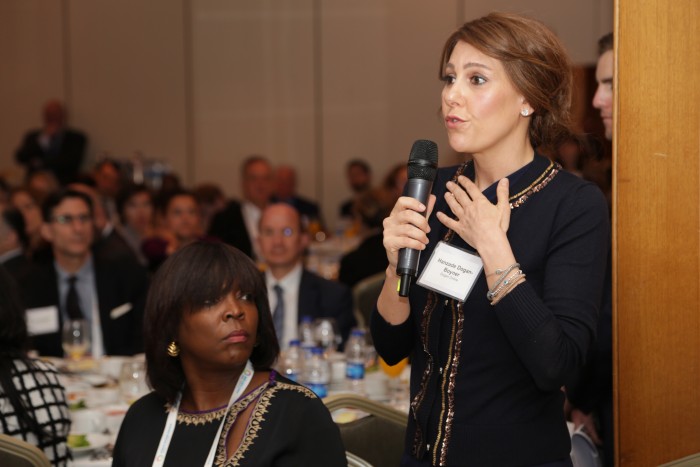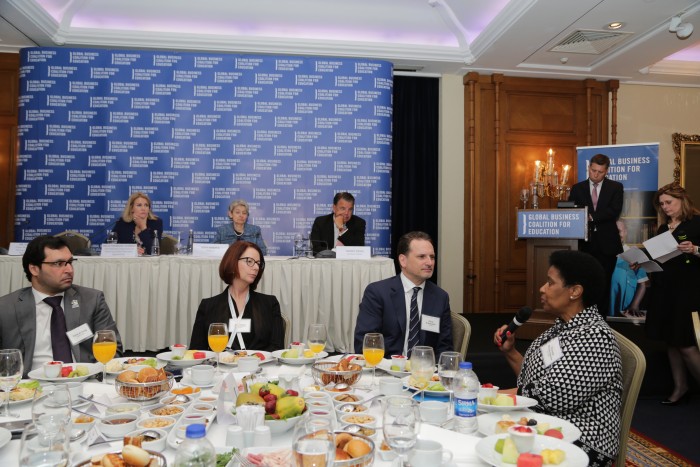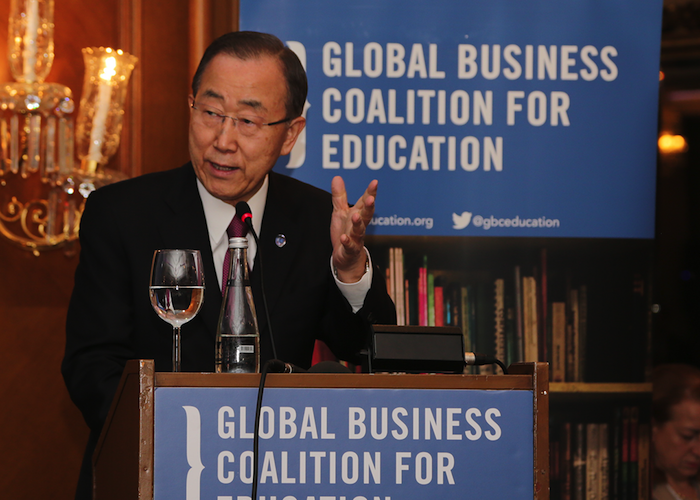In Istanbul, Education Kickstarts Summit Agenda with GBC-Education Event

Photos by Ender Seyyar/GBC-Education.
Education was at the forefront of the agenda today at the first-ever World Humanitarian Summit in Istanbul as GBC-Education kicked off a high-level conversation before the Summit’s opening plenary. During the event Stepping Up in Crises: Finance, Delivery and Innovation in Education, GBC-Education convened 150 high-level leaders from business, government, philanthropic organizations, and donor agencies, including the UN Secretary-General Ban Ki-moon, to address the challenge of millions of children and young people who are left behind in crisis and to celebrate the official launch of the Education Cannot Wait fund.
“It is not by chance that the first meeting of the World Humanitarian Summit is on education,” said Irina Bokova, Director-General of UNESCO during the high-level event. “Education can bring back the normalcy of life within communities.”
The UN Secretary-General opened the conversation by highlighting the importance of education during all circumstances by sharing why he values education.
“[Education] is dear to my heart, personally and professionally,” said UN Secretary-General Ban Ki-moon, who delivered the opening keynote. “We have been failing too many children and young people for far too long. Without education, you cannot achieve anything,” he said, highlighting that companies should consider education as a long-term investment in their future, especially in crisis.
“We are stepping up to the plate and we hope business leaders here will join us,“ said GBC-Education Executive Chair Sarah Brown in agreement of Ban Ki-moon’s sentiment, before announcing a new pledge by GBC-Education to mobilize $100 million for the fund. “[Through our] new set of commitments, we can immediately identify businesses that can provide support when the need arises,” she said, calling on more companies to embrace their effort through the new and more inclusive territory through which they can now contribute to education in emergencies.
The Education Cannot Wait fund, which was launched also on the day of the event, seeks to unite diverse stakeholders including the private sector. Leveraging the business community’s ingenuity to generate financing, delivery and innovation in education through partnerships was highlighted as an edge companies have over donors throughout the panel discussion that followed, moderated by GBC-Education Director of Global Strategy Tom Fletcher, with a special emphasis on how business can form public-private partnerships to scale up their impact.
Finance: Taking Commitments to Scale
Right now, there is an estimated $8.5 million annual funding shortfall to provide education in emergencies. The business community’s role will be absolutely vital to filling this gap, participants agreed.
Hikmet Ersek, Chief Executive Officer of GBC-Education founding member Western Union, is already supporting education in emergencies through a cash transfer program, and demonstrated the pressing need to finance education for those who have left their home country. “[Education] is the number one reason why people send money back home,” he shared.
“People think that education can’t be their first priority, but they are wrong,” said Helle Thorning-Schmidt of the International Commission for Financing Global Education Opportunity, revealing that 99 percent of those polled through the Education Commission prioritize education. “We are in this room together because within the whole humanitarian sector, which is grossly underfunded, education is the least funded,” said Thorning-Schmidt.
Edmund Cain, Vice President of the Conrad N. Hilton Foundation, drew parallels between the Foundation’s unique emphasis on high-risk, high-return investments with great impact for the most vulnerable and the Education Cannot Wait fund. “We believe we are funding scalable projects that make a difference on education in emergencies,” he said noting that he hoped early childhood development would not be neglected.
Delivery: Working Together to Ensure Success
Ultimately, collaboration in delivery will be the driving factor determining whether private sector-driven contributions will remain resilient. The People’s Postcode Lottery UK, for instance, is already partnering with the private sector and Theirworld to supplement education programs with supporting nutrition and transportation assistance. And, to truly deliver education, the most marginalized populations, including girls, cannot be overlooked.
“Education is a long-term commitment,” said Annemiek Hoogenboom, Country Director of the People’s Postcode Lottery. “We have seen with our own eyes, in the Bekaa Valley and elsewhere, how much education can make a difference,” she said noting their support of the Coalition’s work to support the double-shift school system in Turkey, Lebanon, and Jordan.
“We need a comprehensive approach that covers basic rights,” said UN Women Executive Director, Phumzile Mlambo-Ngcuka. Since girls’ education is often threatened by early-marriage and childbirth, reproductive health and reproductive rights should be integrated into learning programs she argued. “[Investing in education] is both about preventing a life without education, and about bringing back those that we have already lost.”
Hanzade Dogan-Boyner, Founding Chairwoman of Turkey’s leading internet company, Dogan Online, emphasized that, from the perspective of a community leader who has witnessed firsthand the effect of the refugee crisis in the Middle East, mapping out a plan of action where different partners can contribute at different levels is just as crucial to the delivery of education as financing.
Innovation: Leveraging Ingenuity for Results-Based Solutions

Creative, business-driven solutions, the speakers agreed, is an area in education development where businesses possess an edge to eliminate barriers to education. Smart gaming, for instance, can readily engage children already behind in their school to help them learn faster and more efficiently, as Per Heggenes, Chief Executive Officer of the IKEA Foundation pointed out.
“It’s not only about getting more money, but it’s also about finding smarter solutions to the crisis,” he said before describing the work IKEA Foundation is doing to help educate Syrian refugee children in Jordan and Lebanon.
During the Supporting Syria and the Region Conference this past February, Coalition members demonstrated how the private sector can take their corporate commitments to scale by leveraging their ingenuity.
“We need bold and innovative solutions. Being bold and being innovative is what the business sector is good at,” said UK Department for International Development (DFID) Director General, Nick Dyer, as he called on companies to scale up their commitments made during the Syria Conference which the UK government co-hosted.
Working together to move forward
“[The movement behind] GBC-Education works only if it is a Coalition. This is not about words: In the business environment, we look at actions and results,” said Ersek, reiterating that partnerships are vital to their success. “This is not about words. When we leave here, I hope we see concrete actions that will change children’s lives forever.”
GBC-Education now calls on the greater private sector to contribute to the fund and transform the future of marginalized children across the world. Want to get involved? Please contact [email protected].

